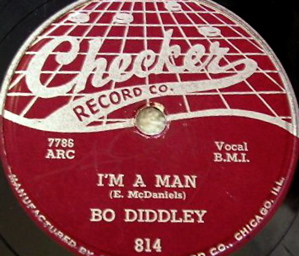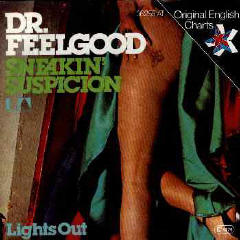Related Research Articles

Ellas Otha Bates, known professionally as Bo Diddley, was an American guitarist and singer who played a key role in the transition from the blues to rock and roll. He influenced many artists, including Buddy Holly, Elvis Presley, the Beatles, the Rolling Stones, the Animals, George Thorogood, Syd Barrett, and the Clash.

"Love Is Strange" is a crossover hit by American rhythm and blues duet Mickey & Sylvia, which was released in late November 1956 by the Groove record label.

"Mannish Boy" is a blues standard written by Muddy Waters, Mel London, and Bo Diddley. First recorded in 1955 by Waters, it serves as an "answer song" to Bo Diddley's "I'm a Man", which was in turn inspired by Waters' and Willie Dixon's "Hoochie Coochie Man". "Mannish Boy" features a repeating stop-time figure on one chord throughout the song.

"I'm a Man" is a rhythm and blues song written and recorded by Bo Diddley in 1955. Inspired by an earlier blues song, it was one of his first hits. "I'm a Man" has been recorded by a variety of artists, including the Yardbirds, who adapted it in an upbeat rock style.

"Bo Diddley" is a song by American rock and roll pioneer Bo Diddley. It introduced the rhythm that became known as the Bo Diddley beat and topped the Billboard R&B chart for two weeks in 1955. The song is included on many of Diddley's compilation albums including Bo Diddley (1958) and His Best (1997). Buddy Holly recorded a version that became his highest-charting single in the UK.

Go Bo Diddley is the second album by American rock and roll musician Bo Diddley, released in July 1959. The album was Bo's first studio album that included some material that hadn't been prereleased on singles, and his first LP for Checker Records. In 2003, Rolling Stone ranked it number 214 on its The 500 Greatest Albums of All Time, and 216 in a 2012 revised list.

"Who Do You Love?" is a song written by American rock and roll pioneer Bo Diddley. Recorded in 1956, it is one of his most popular and enduring works. The song represents one of Bo Diddley's strongest lyrical efforts and uses a combination of hoodoo-type imagery and boasting. It is an upbeat rocker, but the original did not use the signature Bo Diddley beat rhythm.
"Road Runner" is a 12-bar blues song performed by American rock and roll performer Bo Diddley, originally released as a single by Checker Records in January 1960, and later released on the LP record Bo Diddley in the Spotlight. The song reached #20 on Billboard magazine's Hot R&B Sides chart, and #75 on the Hot 100. The song has since been recorded by many artists.

Have Guitar Will Travel is the third studio album by rock and roll musician Bo Diddley. It was released on the Checker Records label in 1960.

Stupidity is a live album by English rock band Dr. Feelgood. It was released in September 1976 and is the band's third overall album. Their mushrooming popularity was confirmed when Stupidity (1976) topped the UK charts.

"Milk and Alcohol" is a song by the band Dr. Feelgood that reached number nine in the UK Singles Chart in 1979. Written by Nick Lowe and Gypie Mayo, and produced by Richard Gottehrer, the song was Dr. Feelgood's biggest hit and continues to be played by the band.

"Down at the Doctors" is a song by the band Dr. Feelgood. The track was recorded in 1978, and appeared on Private Practice, an album by Dr. Feelgood that was released in October that year.

"She's a Windup" is a song by the band Dr. Feelgood. The track was recorded in 1977, and appeared on Be Seeing You, an album by Dr. Feelgood that was released in September that year.

"Sneakin' Suspicion" is a song by the band Dr. Feelgood. It was recorded in 1977 and was the first track on their album, Sneakin' Suspicion, which was released in May that year. It was recorded at the Rockfield Studios and mixed at the Media Sounds Studios in New York.
"Baby Jane" is a song recorded by soul singer Otis Clay in 1969 for Dakar Records. Dr. Feelgood covered the track in 1977, it first appeared on Be Seeing You, a Dr. Feelgood album released in September that year.

"Roxette" is the debut single by the band Dr. Feelgood released in 1974, from their 1975 debut album Down by the Jetty.
"She Does It Right" is a song by the band Dr. Feelgood, recorded in 1974 and appearing on their debut album, Down by the Jetty. The track was written by Wilko Johnson, and produced by Vic Maile. The song was the band's second single release, following their debut "Roxette". The B-side of the record, "I Don't Mind", was also penned by Johnson.

"As Long as the Price Is Right" is a song by the band Dr. Feelgood. From a live recording made in 1979, it appeared on their live album, As It Happens, which was released in May that year. It was recorded at 'The Town House Studios'.

Malpractice is the second album by English rock band Dr. Feelgood, released in October 1975.

"Pretty Thing" is a 1955 song written by Bo Diddley and Willie Dixon and performed by Bo Diddley. The song was Diddley's third single release through Checker Records after "Diddley Daddy". In 1963, the song was released in the United Kingdom where it became Diddley's first of only two songs appearing on the UK Singles Chart, the other single being "Hey Good Lookin'".
References
- 1 2 3 4 Strong, Martin C. (2000). The Great Rock Discography (5th ed.). Edinburgh: Mojo Books. pp. 290–291. ISBN 1-84195-017-3.
- ↑ Roberts, David (2006). British Hit Singles & Albums (19th ed.). London: Guinness World Records Limited. p. 162. ISBN 1-904994-10-5.
- ↑ "Biography by Bruce Eder". Allmusic.com. Retrieved 4 November 2008.
- ↑ Cub Koda. "I'm a Man - Bo Diddley | Listen, Appearances, Song Review". AllMusic. Retrieved 25 January 2014.